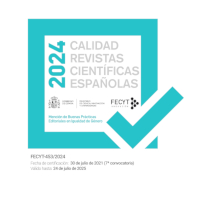Can We Talk about Fashion without Using Foreign Words?
DOI:
https://doi.org/10.18172/cif.3892Keywords:
foreign word, fashion, glossary of terminology, Spanish, English, loansAbstract
This study contains an analysis of the foreign words found in the Spanish language regarding fashion. To carry out this study, the following hypothesis is formulated: most of the foreign words found in the magazines come from English and French. Besides, two different variations of Spanish are taken into account: the one spoken in Spain and the one spoken in Mexico. For the purpose of conducting this research: the sections which are analyzed are the ones dedicated specifically to fashion from the magazines Marie Claire, Cosmopolitan and L’Officiel -both the version published in Spain and in Mexico. The analysis includes a classification of the foreign words according to their source language, their subject area and their frequency. Moreover, some of the foreign words are explained in more detail. The results displays that English can be considered as the language of fashion because of the huge quantity of anglicisms that the texts contain.
Downloads
References
CABRÉ, M. T. (1993). La terminología. Teoría, metodología, aplicaciones. Barcelona: Antártida / Empúries.
CASTILLO FADIC, M. N. (2002). “El préstamo léxico y su adaptación: un problema lingüístico y cultural”. Onomázein (7): 469-496. DOI: https://doi.org/10.7764/onomazein.7.24
CERRILLO RUBIO, L. (2012). El gusto en vestidos: los orígenes de la moda de autor. Valladolid: Universidad de Valladolid.
ESTORNELL, M. (2012). “Préstamos del inglés en revistas femeninas: entre la necesidad denominativa y la estrategia pragmática”. Pragmalingüística (20): 61-91. DOI: https://doi.org/10.25267/Pragmalinguistica.2012.i20.03
FUNDÉU. (2015a). Blog, bloguero y bloguear, términos asentados en español. Recuperado de https://www.fundeu.es/recomendacion/blog-bloguero-bloguear-bitacora/.
FUNDÉU. (2015b). Glosario de la moda. Recuperado de https://www.fundeu.es/wp-content/uploads/2015/03/glosarioModaFundeu.pdf.
GÓMEZ DE ENTERRÍA, J. (2009). La enseñanza/aprendizaje del español con fines específicos. Madrid: Edinumen.
GÓMEZ CAPUZ, J. (2000). Anglicismos léxicos en el español coloquial. Cádiz: Universidad de Cádiz.
GÓMEZ CAPUZ, J. (2004). Préstamos del español: lenguas y sociedades. Madrid: Arco Libros.
GUERRERO, G. (1995). Neologismos en el español actual. Madrid: Arco Libros.
KOCOUREK, R. (1991). La langue française de la technique et de la science. Vers une linguistique de la langue savante (2a ed.). Wiesbaden: Brandstetter.
PRATT, C. (1980). El anglicismo en el español peninsular contemporáneo. Madrid: Gredos.
REAL ACADEMIA ESPAÑOLA. (2005). Diccionario panhispánico de dudas. Recuperado de http://www.rae.es/recursos/diccionarios/dpd.
REAL ACADEMIA ESPAÑOLA. (2017). Diccionario de la lengua española (23ª ed.). Recuperado de http://www.rae.es/.
VILCHES, F. (2014). La lengua española estándar en la red: tensión entre oralidad y escritura. Madrid: Dykinson.
Downloads
Published
How to Cite
Issue
Section
License
The authors retain copyright of articles and authorize CIF the first publication. They are free to share and redistribute the article without obtaining permission from the publisher as long as they give appropriate credit to the editor and the journal.
Self-archiving is allowed too. In fact, it is recommendable to deposit a PDF version of the paper in academic and/or institutional repositories.
It is recommended to include the DOI number.
This journal is licensed under a Creative Commons Attribution 4.0 International License














